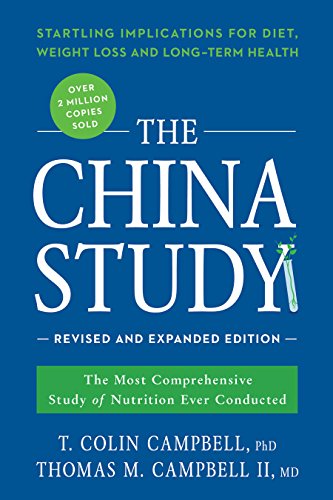

This article is an excerpt from the Shortform summary of "The China Study" by Colin Campbell. Shortform has the world's best summaries of books you should be reading.
Like this article? Sign up for a free trial here .
America spends more money on healthcare, per capita, than any country in the world. So Americans must be the healthiest, right? Not quite. There are many health issues in America and we are nowhere near the healthiest nation.
Two-thirds of our population is overweight, 25 million Americans are diabetic (up by 10 million since 2005), and half of Americans take a prescription drug every week. If we spend so much on our health, why are there so many health issues in America?
The Health Issues in America: 4 Problems
T. Colin Campbell and his son, Dr. Thomas Campbell, authors of The China Study, believe there are four primary health issues in America:
Problem #1: As a Country, We’re Sick
We struggle with obesity, diabetes, cancer, and heart disease at alarmingly high rates.
For example, in 2005, more than one-third of American adults were obese. This percentage has been increasing for decades.
A related problem, one out of eleven Americans is diabetic, and that number keeps rising too, even though as a community we’re more knowledgeable about this disease than ever before. Even more sobering is the fact that 34% of people with diabetes don’t even know they have it. Diabetes is particularly serious because it can lead to issues such as blindness, heart disease, limb amputation, and early death. Further, this disease is expensive: 20% of our nation’s health care costs is directed toward diabetes treatment. Still, fast-food restaurants sell items proven to lead to diabetes, and we’re spending more time in front of screens, further increasing our risk.
Cancer is another disease that’s startling in its prevalence. Males have a 47% chance of developing cancer in their lifetimes and females have a 38% chance. Contrary to what we’re often told, cancer is not a natural or inevitable disease. Most cancers are preventable through diet and lifestyle choices, but cancer death rates haven’t decreased over the past 20 years, despite all we’ve learned about this group of diseases.
And then there’s heart disease, the biggest killer in the U.S., killing 1 out of every 3 Americans. Perhaps even more so than cancer, whether we get heart disease is largely under our control. Close to 100% of heart disease is preventable (and even reversible) through diet. This is a big health issue in America.
Problem #2: Our Healthcare System is Dangerous
Although an increasing number of doctors are learning the value of nutrition and lifestyle changes, the majority still turn to surgery and pills rather than food and holistic treatments to heal their patients.
While these treatments can be effective, they’re not always safe. In fact, medical care is the 3rd leading cause of death in the U.S., although the U.S. Centers for Disease Control and Prevention refuses to acknowledge it on its list of the top ten causes of death.
Doctor errors, medication errors, and deaths from drugs and surgery kill 225,400 people every year. This is less than the number of people killed by heart disease (710,760) and cancer (553,091), but more than those who die of strokes (167,661) or respiratory diseases (122,009).
These are deaths resulting from people following doctors’ orders and taking medication as directed. And 225,400 deaths is a conservative estimate. It doesn’t include deaths from clearly labeled side effects or deaths from overdoses. The actual number of deaths caused by medical care is probably closer to 400,000 per year. This is a big health issue in America.
Clearly, doctors aren’t following the Hippocratic Oath to do no harm. But it’s not necessarily their fault. Our system encourages the use of risky surgeries and drugs rather than the safer (and often more effective) treatments of diet and lifestyle changes.
Problem #3: Our Health Care System is Expensive
The costliness of our system impacts us as individuals and as a country.
Firstly, the system is expensive for our government. We spend more money on health care than any other country in the world. In 1997, that was $3,912 per person per year. The next closest country in spending was Germany, at $2,364 per person. Korea spent only $870 per person.
With all the money spent, you’d think our healthcare system would be the best in the world. It’s not. Ours is regularly rated one of the worst. One year, the World Health Organization ranked the U.S. healthcare system 37th best in the world.
Evidently, the system doesn’t need to be expensive to be effective. Switzerland spends substantially less on health care than we do, but its citizens live an average of 4.5 years longer than Americans.
Secondly, not only is the system expensive for the government, it’s expensive for individuals. We spend huge amounts of our own money to be healthy.
In the 1980s, this meant a moderate 9% of our disposable incomes. But in 2011, that percentage doubled, and it’s projected to be almost 20% in 2022. Health is valuable, and if we actually got healthier after spending that much money, the price might be worth it. However, 20% is a lot of money for treatments that may do more harm than good. This is a big health issue in America.
The system isn’t just bad for our wallets. A third way the cost of our healthcare system impacts us is that it dictates and limits our treatment options. For instance, doctors often choose your treatment based on what your insurance will cover. This treatment isn’t always the safest, most effective, or most efficient one available.
Finally, the system doesn’t cover everyone. Even though we’re spending all this money, tens of millions of people don’t have insurance or access to basic care.
Our health system is supposed to heal us, but too often, it’s hurting us.
Problem #4: There’s Confusion Around Nutrition
Another problem Americans face is that we’re confused about what to eat to be healthy. This is largely due to the prevalence of fad diets and the reductionist approach to research practiced by many scientists and marketers.
We’re susceptible to fads that promise easy solutions to our serious health problems. High-protein, high-fat diets like the Atkins, South Beach, and Paleo diets teach us that cutting out carbs will help us lose weight and cure our diseases, even though these diets have been widely discredited and there’s a growing body of evidence that says they’re dangerous for us.
Also leading to our confusion about nutrition is the practice of reductionism. The Campbells use this term to talk about the way scientists tend to focus on one dietary element at a time, like vitamin A or calcium. This oversimplifies our biological systems and the holistic effects of food on the body, leading to confusing and contradictory research results.
Health Issues in America: How Do We Solve Them?
Our country’s health problems are dire, and it’s natural for us to grasp at the newest diet books in the hopes of finally discovering a cure. Most of us just want someone to tell us what to eat, when, and how much. But it’s hard to stick to these diets when we don’t really understand their rationale.
The Campbells believe that the best diet for disease prevention, and the diet that could solve most of the health problems in America, is a whole foods, plant-based (WFPB) diet.
But they also know that it’s futile to attempt to prove that the WFPB diet is the best diet. You can’t prove anything in the world of medicine and nutrition. There are so many factors that go into being healthy, such as lifestyle, diet, and genes, and the ways in which these factors interact are so complex that it’s hard to isolate a single cause of anything. Time and financial limitations of experiments also make it hard to definitively prove a theory.
Therefore, they can’t give you absolute proof that a whole foods, plant-based diet is the healthiest one. They can only give you evidence from a wide variety of studies. You draw your own conclusions from there.
———End of Preview———

Like what you just read? Read the rest of the world's best summary of "The China Study" at Shortform . Learn the book's critical concepts in 20 minutes or less .
Here's what you'll find in our full The China Study summary :
- Why animal proteins (meat, milk) might cause cancer, diabetes, and other diseases
- Why the medical institution is structured to hide the truth about disease and food
- The precise diet you'll need to eat to live longer and feel happier






